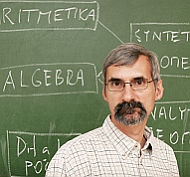The Fernando Gil Award, which includes a generous monetary prize, is sometimes called the Nobel Prize for philosophy. The first annual award was granted to Professor Ladislav Kvasz, a member of the Department of Mathematics and Didactics of Mathematics since 2007, for his book called Patterns of Change: Linguistic Innovations in the Development of Classical Mathematics, which bridges the disciplines of mathematics and philosophy.
You earned the prize by writing the book Patterns of Change, Linguistic Innovations in the Development of Classical Mathematics which was published in English two years ago. However, it had been already published earlier in Slovak. What’s the story behind the publication?
The book focuses on the ways the language of mathematics changes over the course of history. I believe that there are basically four different ways of how the language of mathematics develops. The problem was that I wasn’t able to illustrate the first one on mathematics and I did so using physics instead. Originally, I wrote the book in Slovak and published it in 1998. It has the first chapter on physics and the following three chapters on mathematics. Then I translated it into English as it was. Later, I met Professor Donald Gillies in London and he warned me that mathematicians might not take the physics part too well and vice versa, and in the end, nobody will read the book. He suggested I drop the physics and now I can see it was good advice. The English version therefore discusses only three types of changes in mathematics.
The Fernando Gil Award is not that well-known in the Czech Republic. Who is it awarded by?
Fernando Gil was a notable Portuguese philosopher, who introduced an analytical approach to philosophy. He died in 2006. The International Fernando Gil Award was introduced at a suggestion of the Calouste Gulbenkian Foundation, named after and founded by the Portuguese oil magnate. It is awarded by the Portuguese Ministry of Education, based on a decision of a twelve-member committee. |
Professor RNDr. Ladislav Kvasz, Dr., has been the member of the Department of Mathematics and Didactics of Mathematics since 2007. He teaches mathematical analysis, set theory, logic and history of mathematics. In 1986, he graduated from the Faculty of Mathematics and Physics of the Comenius University in Bratislava, Slovakia, in the systems theory and selected parts of theoretical physics programme. In the course of his studies, he received the Minister of Education award. In 1992, he started a doctoral degree in philosophy at the Comenius University Faculty of Arts. He received his Ph.D. in 1995 based on his dissertation Classification of Scientific Revolutions. In 1998, he received assistant professorship in philosophy thanks to his work On Revolutions in Science and Ruptures in the Language of Science. In 2006, he received assistant professorship in mathematics with his work Analysis of the Changes in Language During the Reconstruction of the History of Mathematics. In the Spring of 2010, he was granted full professorship at Charles University. |
What does the award comprise?
I will receive the award at a ceremony in Lisbon in March of 2011. I will give two lectures there, one for the general public (which will also be published by the Calouste Gulbenkian Foundation) and the other for experts and students. There is also a monetary prize of 125,000 EUR.
Would you call yourself a mathematician, or a philosopher?
There are mathematicians, who don’t like philosophy, and vice versa. But both terms are traditionally attributed to Pythagoras. Before Pythagoras, the word “sofos” (sage) was commonly used. Pythagoras introduced a technical term for those who love knowledge and called himself the same. He also introduced the word “mathematics”. In my opinion, mathematics is doing philosophy with a compass and a ruler. Philosophy asks very general questions, but some of them can be formulated precisely enough that they can be also answered in an exact manner. And that’s where mathematics comes into play, offering precise answers to very deep questions that philosophy used to ask. For example, the question of what space is – it’s a deeply philosophical question. Mathematics creates theories of different kinds of spaces and explores alternative spaces. Therefore, I think that many mathematical questions are in fact philosophical. Only the method is different. There is a huge overlap between the two disciplines.
Then why don’t we see more programmes in mathematics and philosophy at universities?
This is mainly the case in our country. It depends on the tradition, on what type of mathematics and philosophy is being pursued. In London or at Berkeley, it is a regular programme. It doesn’t have many students, but it’s quite renowned. It also depends on the way universities are structured. Ours is divided into faculties that are independent of each other and don’t communicate much. In the Anglo-Saxon tradition, there are colleges that combine all subjects in one body.
Oficiální stránky Mezinárodní ceny Fernando Gila
(Lucie Kettnerová)















